
“Four in five tradespeople experience mental health issues due to their job.”[1] That’s why, this National Tradesmen Day, we’re raising awareness of the mental health problems affecting individuals across the trade industries.
Quick Links
- 4 in 5 Tradespeople Suffer Mental Ill Health Due to Work
- Attitudes Hampering Mental Health in the Trades
- Helping Tradespeople with their Mental Health
- Further Information
4 in 5 Tradespeople Suffer Mental Ill Health Due to Work
Ironmongery Direct commissioned a survey investigating the mental health of tradespeople. It uncovered that 82% (four in five) of tradespeople have encountered stress, anxiety, or depression because of their work. In fact, 56% of tradespeople surveyed reported suffering work-related stress at least once a month. Moreover, 27% of tradespeople attested to feeling stress, anxiety, or depression every week, and 40% admitted to experiencing these symptoms every two weeks.
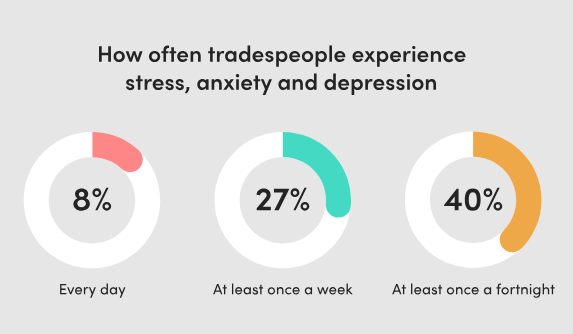
The impact of this is that 8% of UK tradespeople are taking or have taken anti-depressants or other medicines (up from 6% in 2023), while 5% have spoken to a counsellor or therapist. Ironmongery Direct posits that the number of individuals seeking counselling or therapy should be higher as a shocking nine in ten workers revealed they did not know how to access support services.
Further to this, 16% of tradespeople reported taking time off work due to mental ill health. This number has risen 2 percentage points from 2023. This rate is highest amongst millennial tradespeople, an astonishing 28% of which have “taken a leave of absence due to stress”. Yet, it is likely these percentages should also be higher as Ironmongery Direct found that over a quarter of tradespeople (26%) felt unable to take sick leave for mental health reasons.[2]
Pressures on Mental Health
There are a multitude of pressures that may contribute to mental ill health. The severity of these factors will vary from person to person. Nevertheless, Ironmongery Direct uncovered several reasons that were ubiquitous among tradespeople.
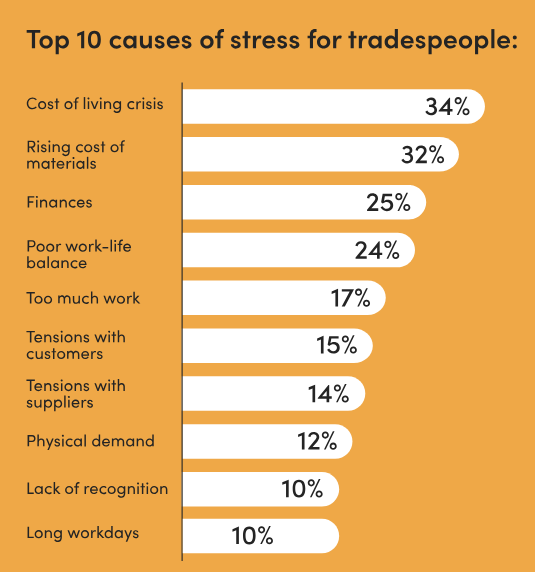
Financial factors are the leading causes of mental stress: these range from the cost-of-living crisis (34%) to the cost of materials (32%) to miscellaneous money concerns (25%). 16% of respondents said the cost-of-living crisis had made their mental health worse.
Other reasons cited were a poor work-life balance (24%); an excessive workload (17%); long workdays (10%); and lack of sleep (8%). Workload was a leading concern among Gen Z tradespeople.[3]
Mental Health by Trade
Ironmongery Direct’s survey found that, while mental ill health is an issue across all sectors, rates of mental stresses varied from industry sector to industry sector. The report uncovered that joiners (92%) and bricklayers (90%) were the most likely to experience mental health problems respectively citing the rising cost of materials (41% of joiners) and cost of living crisis (27% of builders) as their main causes of anxiety.[4]
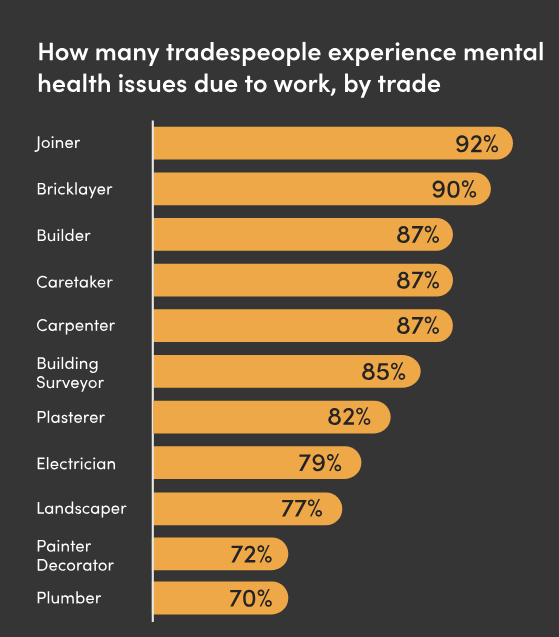
Trade-specific studies have also found similar trends among respondents.
Construction
A study into the mental health of self-employed construction workers, detailed on Professional Builder in July 2022, found that of three hundred respondents one-third are living with severe anxiety. The article also revealed that over two-thirds of surveyed construction workers felt there is a stigma surrounding mental health in the industry, thereby preventing open discussions. Others, 44%, blamed an excessive workload for mental ill health within the construction sector.
The article continues to say men working in the construction sector are three times more likely to die by suicide than men working in any other sector. The Chartered Institute of Building (CIOB) estimates that two construction professionals die by suicide in the UK every day – that’s seven-hundred people a year![5]
International Men’s Day 2023: Helping Men in Construction with Their Mental Health
Electricians
Included as part of Ironmongery Direct’s 2022 Mental Health Survey, Electrical Direct uncovered that over a fifth (21%) of electricians have experienced mental ill health due to work. Of these respondents, 24% said they felt symptoms once a fortnight; 8% said once a week; and 15% reported suffering symptoms every day. Work-related stress has led to 23% of these electricians taking time off work. Electricians cited the following as being the main causes of stress:
- Financial worries (31%)
- Tensions with suppliers (29%)
- Abuse from customers (29%)
- Tensions with business partners (28%)
- Tensions with customers (27%)
- Workload (20%)
- Catching COVID 19 (20%)[6]
Engineering
Working in partnership, The Engineer and Hays (a specialist recruitment company) revealed that 15% of engineers who were willing to respond were suffering from a mental health condition caused by their job and that 25% were struggling mentally due to their work. Furthermore, only 11% of respondents said they did not experience stress due to their work. Conversely, 63% of engineers attest to suffering moderate to extreme job stress, while 26% felt mild job stress.
The dominant cause of job stress reported by engineers was workload (68%). Multiple factors currently contribute to an unmanageable workload across the engineering sector, including a lack of resources, and an ongoing skills shortage resulting in many organisations being short-staffed. Other sources of stress include management style (50%) and pressure to meet targets and deadlines (47%).[7]
Tradespeople Testimonials
As part of their research, Ironmongery Direct collected firsthand accounts of tradespeople’s experiences.
Note: many testimonials mention Match for the Mind. This was an inter-trade charity football tournament organised by Ironmongery Direct to raise money for the mental health charity Mind. It took place on the 25th May 2024 at Stamford Bridge.[8]
Anonymous Electrician from Sheffield
“I’ve experienced work-related stress due to long working hours, unrealistic deadlines and working away from family and friends for long periods of time. Working as an electrician is physically and mentally demanding as you have little downtime to relax, which can cause stress and make you feel isolated.
I never really spoke to anybody about my feelings as there is very much a culture of ‘get on with it’ or ‘man up’. I worried that if I did speak up people might think I was incapable of doing the job that I get paid to do.
However, it’s certainly important that people feel comfortable being open and talking about their struggles and issues so that they can be resolved. Luckily, mental health is no longer the taboo subject it once was but it is still a subject that people find hard to admit. More needs to be done to reassure people that opening up in a safe environment with trustworthy people is healthy, and that you are certainly not on your own, whatever you are experiencing.”
~ Anonymous Electrician from Sheffield.[9]
Rebecca Bishop, Co-founder of Elite Building
“I experience burnout far too regularly. I have often felt stressed at work but the seriousness of it started in 2020 at the onset of the pandemic. I remember asking my husband if it were possible to die from stress as I was genuinely concerned.
I have often just tried to survive it and make it to the other side. Sometimes I share vulnerably on social media platforms about stress, burnout and mental health, but I also feel this pressure (that I put on myself) to keep it together all the time – which is ridiculous, because I am human and this is not possible.
Tradespeople need to understand that they are not alone. Never. Things don’t have to stay the way they are. We just need some brave people to step up and be vulnerable and share, which then might encourage others to share as well.”
~ Rebecca Bishop, Co-founder of Elite Building.[10]
Frazen Budd, Builder
“I have struggled with my own mental health, but I am lucky enough to have my children as a constant reminder of why I have to get up and carry on every day. Sadly I’ve worked with a lad that didn’t have the same family network, and one day he didn’t show up for work. He never spoke to anyone about his struggles and tragically died by suicide. It is so important to remove the stigma around people talking to someone about their feelings.”
~ Frazer Budd, Builder.[11]

Jay McCrindle, Plumber
“I am 29 years of age and I lost my father through suicide at the age of 14. I have always been plagued with mental health issues. I have been confused and unsure since losing my father. However, with the guidance of Mind and my family, I have now accepted what happened. I am thrilled to have the opportunity to combine my two passions of mental health awareness and Chelsea by playing in the Match for the Mind.”
~ Jay McCrindle, Plumber.[12]
Josh Skeates, Carpenter & Joiner
“It’s easy to feel that within these industries you must be strong and sometimes look like you have no weaknesses. However, after experiencing my own troubles and seeing other colleagues struggle, I push each day to have what we call an ‘agony hour’ first thing in the morning, where we speak about anything that may be on our minds, usually from the evening before, and we find this creates an environment in which we feel comfortable to talk.”
~ Josh Skeates, Carpenter & Joiner.[13]
Mark Waldron, Carpenter & Joiner
“As the director of my own limited company with over 15 employees and subcontractors, mental health is something we take very seriously within our workplace. I always ask the guys if they have any problems, and to speak to me openly about any issues they’re facing, whether that be in or out of the workplace. Health, family and happiness are priorities.
A very close friend of mine that I played sports with sadly died by suicide after having mental health problems. It really is a silent killer, as no one around him would ever have known. He was the most outgoing, loud and funny person in the room and it’s truly devastating. I feel mental health in the workplace, especially in the trades, is so important to address and I’m thrilled to help raise funds to help a great cause at Match for the Mind.”
~ Mark Waldron, Carpenter & Joiner.[14]
Paul Blanch, Builder
“Our work is so dependent on weather and this becomes stressful, and can interfere with other parts of your life. I have experienced this on occasion, and in the last few years, I have had a few sessions with a therapist to release this pressure and talk openly about personal issues. I find this really helps and refocuses your mind.”
~ Paul Blanch, Builder.[15]
Attitudes Hampering Mental Health in the Trades
Despite the obvious challenges facing the trade sector, many tradespeople still do not feel comfortable talking about their mental health.
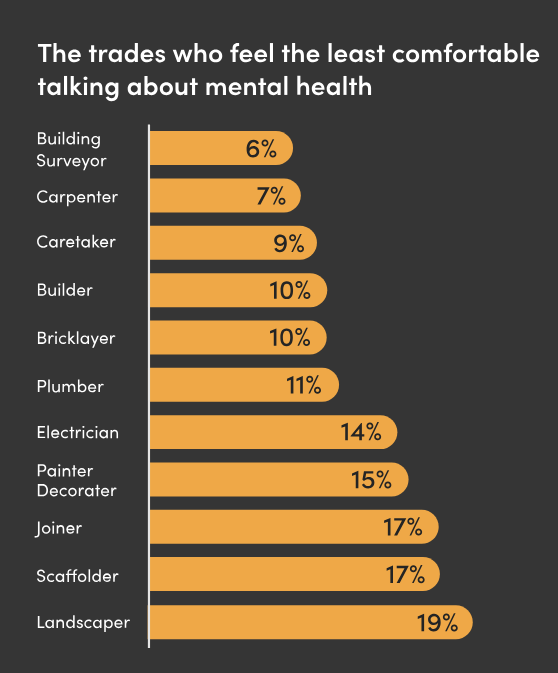
88% of tradespeople surveyed by Ironmongery Direct said they felt uncomfortable talking about their mental health and just one in ten have spoken to friends or family about their mental stresses; this is down from 17% in 2023. Surprisingly, Gen Z (6%) and Millennials (8%) were the least likely to speak to friends or family about their mental struggles. Sadly, 7% of UK tradespeople are concerned about what others would think if they divulged their mental situation.
Other studies bear out this data. Ironmongery Direct’s 2022 Mental Health Survey found that just 11% of electricians felt comfortable discussing their mental stresses with others; while a further 11% worried what people would think of them if they were honest about their struggles. Similarly, two-thirds of construction workers surveyed by Mates in Mind said it is the stigma surrounding mental health that stops them from talking about it.[16]
Furthermore, Hays and The Engineer’s Future of Engineering survey uncovered that over half (51%) of engineers who experience stress at work have not spoken to their employer or manager about it. This is primarily because engineers don’t feel comfortable expressing that they feel stressed at work (39%); they don’t think their employer can help (34%); or they anticipate it would affect their career negatively (19%). Worse, of the 49% of engineers who have discussed work stress with their employer, 43% said there was not a positive outcome. Additionally, while 45% of engineers did attest that their employer provides support and tools to navigate stress at work, 35% said they did not, and 20% were uncertain.[17]
Additionally, another survey found that 33% of construction workers want better and more mental health support: 31% thought there should be better support in their workplace; 44% wanted better access to professional treatment; and finally, 56% believed there should be more honest conversations surrounding mental health.[18]
Helping Tradespeople with Their Mental Health
Thankfully, there are several simple steps that tradespeople and their employers, friends, and family can take to protect the mental health of individuals working in these sectors.
Protecting Tradespeople’s Mental Health
Creating a trusting, caring environment is essential to helping tradespeople open up about their stresses and struggles. Ensuring employees have access to the tools and support required to navigate work stress is just part of the solution. An honest, accepting attitude towards discussing mental health is also critical, as is learning to spot warning signs that indicate a colleague is struggling. Therefore, it is highly recommended that businesses invest in mental health training; enact what they learn; and follow through on their policies/guidance.[19]
Friends and family can also help to foster a safe, nurturing environment in which their loved ones can be honest about their mental struggles. Mates in Mind, a mental health charity concerned with the construction sector, offers the following nine tips on starting a reassuring, honest conversation about mental stress:
- Ask twice: don’t take “I’m fine” at face value. Follow up on this response as it may encourage someone to open up about how they are actually feeling.
- Keep it informal
- Be supportive
- Use open questions
- Listen: let the other person do most of the talking but don’t press them to speak.
- You don’t have to have the solution: listening and empathising are often better than offering advice.
- Follow up
- Look after yourself too: look after your mental health too and seek support if you need it.
- Connect them to information and support[20]
Get More Information About Starting an Effective Conversation About Mental Health
5 Tips to Protect Your Mental Health
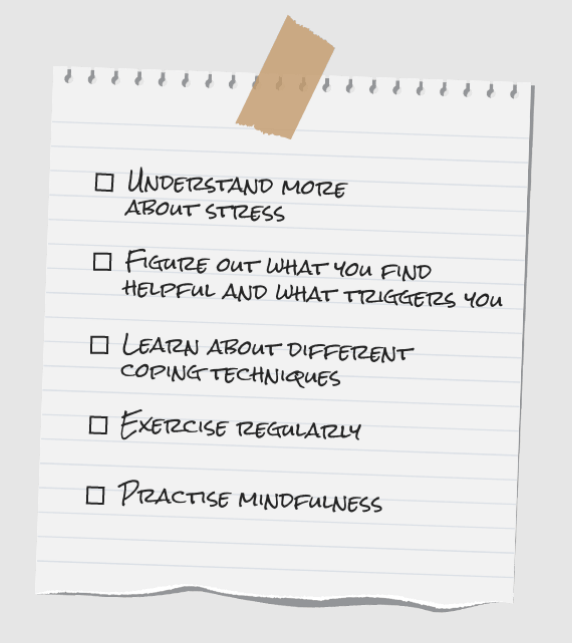
In addition to talking honestly with your employer or trusted loved one, and seeking tools or support when you need them, mental health charity Mind offers the following five tips on dealing with work stress:
- Understand more about stress: try to identify how stress affects you
- Figure out what you find helpful and what triggers you
- Learn about different coping techniques: discovering more about different coping techniques, such as exercise, hobbies, or medical intervention, can help you find the one(s) that works best for you.
- Exercise regularly
- Practice mindfulness: this helps many people avoid being overwhelmed by stress or negative emotions; Mind describes mindfulness as “a technique you can learn which involves noticing what’s happening in the present moment, without judgement. You might take notice and be aware of your mind, body, or surroundings”.[21]
Further Information
If you or someone you know is struggling, or if you’re looking for ways to improve your mental health and that of your colleagues, the following charities and organisations can offer help, support, and resources:
PASS Ltd is a leading UK provider of test equipment, thermal cameras, tools, training, and calibration. For more information about any of these services, please contact our team on 01642 931 329 or via our online form.
[1] Ironmongery Direct, Mental Health in the Trades: 2024 Report, last accessed 20 September 2024.
[2] Ironmongery Direct, Mental Health in the Trades: 2024 Report.
[3] Ironmongery Direct, Mental Health in the Trades: 2024 Report.
[4] Ironmongery Direct, Mental Health in the Trades: 2024 Report.
[5] Professional Builder, Mental health in the construction industry, last accessed 20 September 2024.
[6] Electrical Direct, Raising awareness for mental health in the electrical trade, last accessed 20 September 2024.
[7] Paul Gibbens, ‘Opinion: Is supporting mental health a priority within engineering?’, The Engineer, last accessed 20 September 2024.
[8] Ironmongery Direct, Mental Health in the Trades: 2024 Report.
[9] Ironmongery Direct, Mental Health in the Trades: 2024 Report.
[10] Ironmongery Direct, Mental Health in the Trades: 2024 Report.
[11] Laura Forsyth, ‘Four in five tradespeople have mental health problem due to work’, City A.M., last accessed 20 September 2024.
[12] Laura Forsyth, ‘Four in five tradespeople have mental health problem due to work’.
[13] Laura Forsyth, ‘Four in five tradespeople have mental health problem due to work’.
[14] Laura Forsyth, ‘Four in five tradespeople have mental health problem due to work’.
[15] Laura Forsyth, ‘Four in five tradespeople have mental health problem due to work’.
[16] Professional Builder, Mental health in the construction industry.
[17] Paul Gibbens, ‘Opinion: Is supporting mental health a priority within engineering?’.
[18] Toolstation, ‘Toolstation Supports the Trades with Mental Health Under Construction Podcast’, ECN, 42.08 (Aug 2022), at p.10.
[19] Electrical Direct, Raising awareness for mental health in the electrical trade.
[20] Professional Builder, Mental health in the construction industry.
[21] Mind, Mindfulness, last accessed 20 September 2024.


